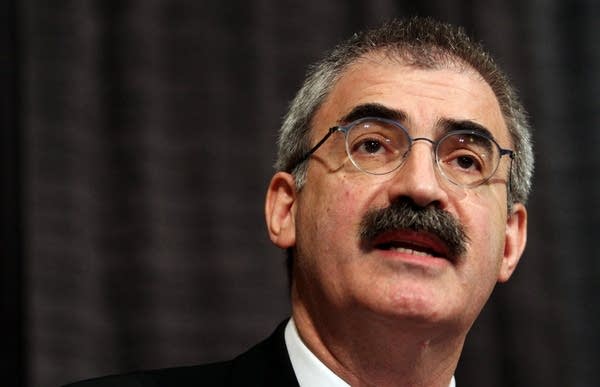Bills would redistribute MnSCU power from central office to campuses
Go Deeper.
Create an account or log in to save stories.
Like this?
Thanks for liking this story! We have added it to a list of your favorite stories.
After a monthslong dispute between faculty and leaders over the way the Minnesota State Colleges and Universities system is run, state lawmakers have introduced legislation that would curb some of the powers of MnSCU's central office.
Bills in both chambers would force MnSCU officials to disclose information about consulting contracts they have signed. A Senate bill announced Monday would give campuses more decision-making authority in selecting their presidents.
The proposals, which appear to be bipartisan, follow faculty and student criticism that MnSCU leaders have exercised too much power and have been too secretive in their dealings.
"I heard a lot of complaints from students, faculty, staff and community members with their concerns about the MnSCU central office, and the amount of authority that the central office has over our local colleges and universities," said state Sen. Jeremy Miller, R-Winona, author of one of the bills.
Turn Up Your Support
MPR News helps you turn down the noise and build shared understanding. Turn up your support for this public resource and keep trusted journalism accessible to all.

In a written response to the bills, MnSCU spokesman Doug Anderson said system officials "look forward to being engaged in these conversations at the legislature."
After months of feuding, MnSCU faculty leaders and system representatives announced an agreement earlier this month that would give faculty a larger say in "Charting the Future," Chancellor Steven Rosenstone's plan to reform the system. MnSCU's two faculty unions pulled out of the reform talks in disgust last fall, complaining the chancellor was not listening to them.
Some of the language in the two bills addresses concerns in that dispute.
A proposal by state Rep. Ben Lien, DFL-Moorhead, would require MnSCU leaders to disclose the contracts they've signed with outside consultants.
Within 30 days of signing a contract, MnSCU would have to post on its website the identity of the consultant, terms of the contract, and the nature of advice or analysis. The governing board of trustees would also discuss the contract at its next public meeting.
Rosenstone has received widespread criticism from faculty and students since news broke in July that he had quietly signed a $2 million consulting contract with consulting firm McKinsey & Co. for its work on the chancellor's reform plan.
In the past six months, critics of the reform effort repeatedly mentioned the contract, saying Rosenstone's failure to inform the public about it was a signal he was not trustworthy.
"That has become a real point of contention," Lien said. "If faculty and students had been able to see the details of the contract, they would have felt more involved with the whole implementation, with the whole process, from the beginning."
MnSCU needs "some latitude" to sign contracts, Lien said, but more transparency and disclosure "could kind of avoid some of these issues of contention coming up in the future."
After the uproar over the consulting contract, MnSCU trustees changed policy to lower the threshold of public approval of contracts from $3 million to $1 million. Lien's bill sets no such bar, but said he hopes to include one later this session.
Miller's proposal, the MnSCU Campus Autonomy Act, would require trustees to justify the amount of centralization in the system. The board would have to submit a report every two years that laid out the "appropriate" balance of power between the central office and its campuses. The report would have to outline what should remain centralized within MnSCU, and what should be left to campuses.
Miller acknowledged that MnSCU leaders could write a report supporting heavy centralization, but said, "We'll see what the report says, and if we need to change [the reporting requirement], we can consider doing so."
He also would also give campuses more of a say in the selection of their presidents. His proposal would establish a local advisory committee that includes faculty, students and alumni.
After MnSCU central authorities recruited candidates and drafted an initial list of presidential prospects, the campus committee would meet to narrow the field. It would submit a list of finalists from which system leaders could then choose a president. The committee could forward its own nominees as well, Miller said.
Although the current selection process includes input from faculty, students and community members, Jonathan Bohn, director of government relations for the Inter-Faculty Organization, said he has heard from students who felt their recommendations at times had been "disregarded."
Miller said his bill ensures local authority in the decision-making process.
"Decisions are best made at the local level," Miller said. "Our MnSCU colleges and universities should have more of an allegiance to the students and communities they serve — and not a central office."
Miller said his proposal had nothing to do with recent allegations that two community college presidents had plagiarized their doctoral dissertations — allegations that claimed that the selection process is flawed. He said he started working on the proposal long before the allegations came to light.
"The overall goal of the legislation is to restore campus autonomy for our colleges and universities throughout the state," Miller said. "A lot of them feel like they're losing their decision-making authority to the MnSCU central office, and they want some of that autonomy back."
Dear reader,
Your voice matters. And we want to hear it.
Will you help shape the future of Minnesota Public Radio by taking our short Listener Survey?
It only takes a few minutes, and your input helps us serve you better—whether it’s news, culture, or the conversations that matter most to Minnesotans.



